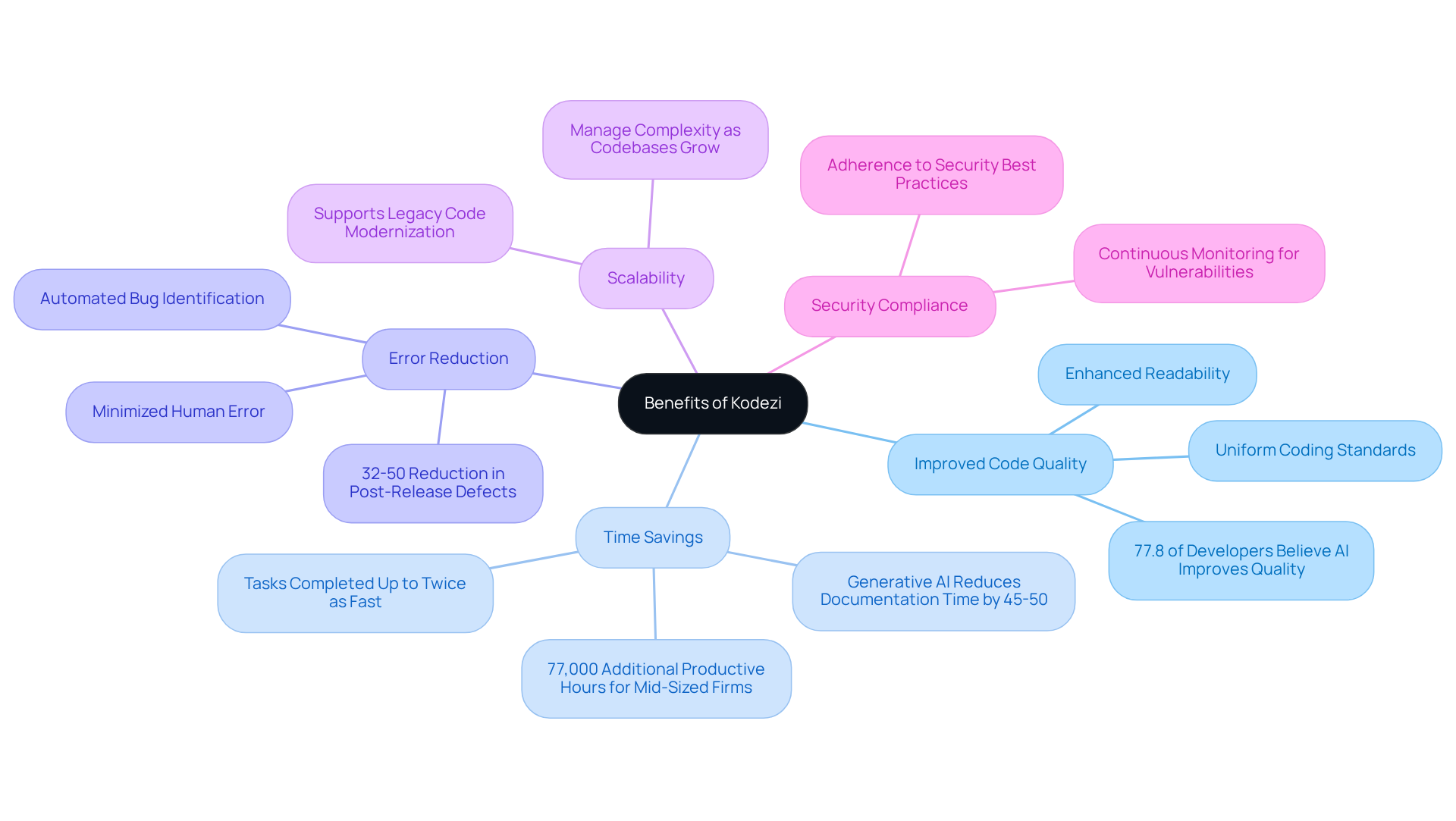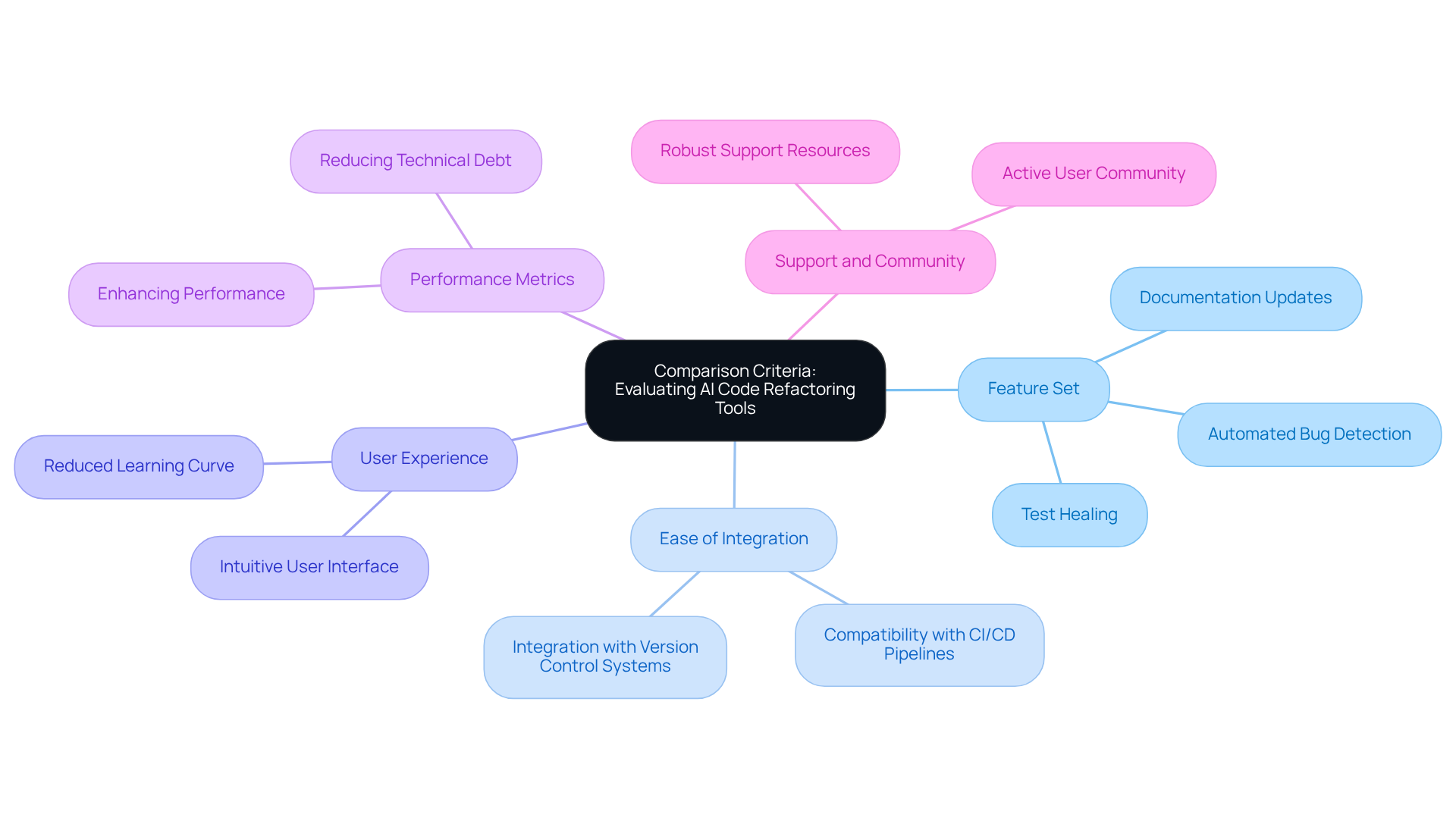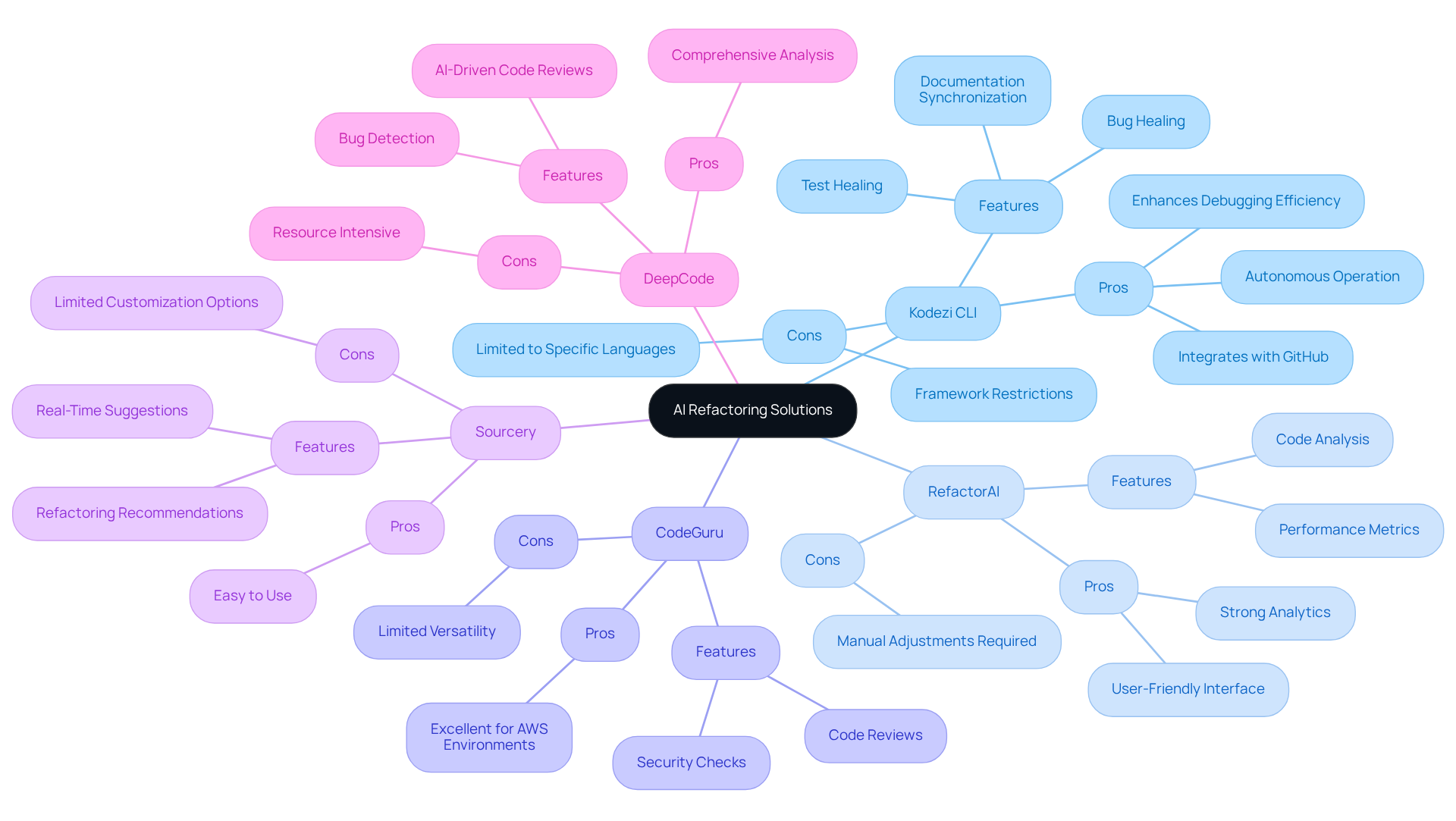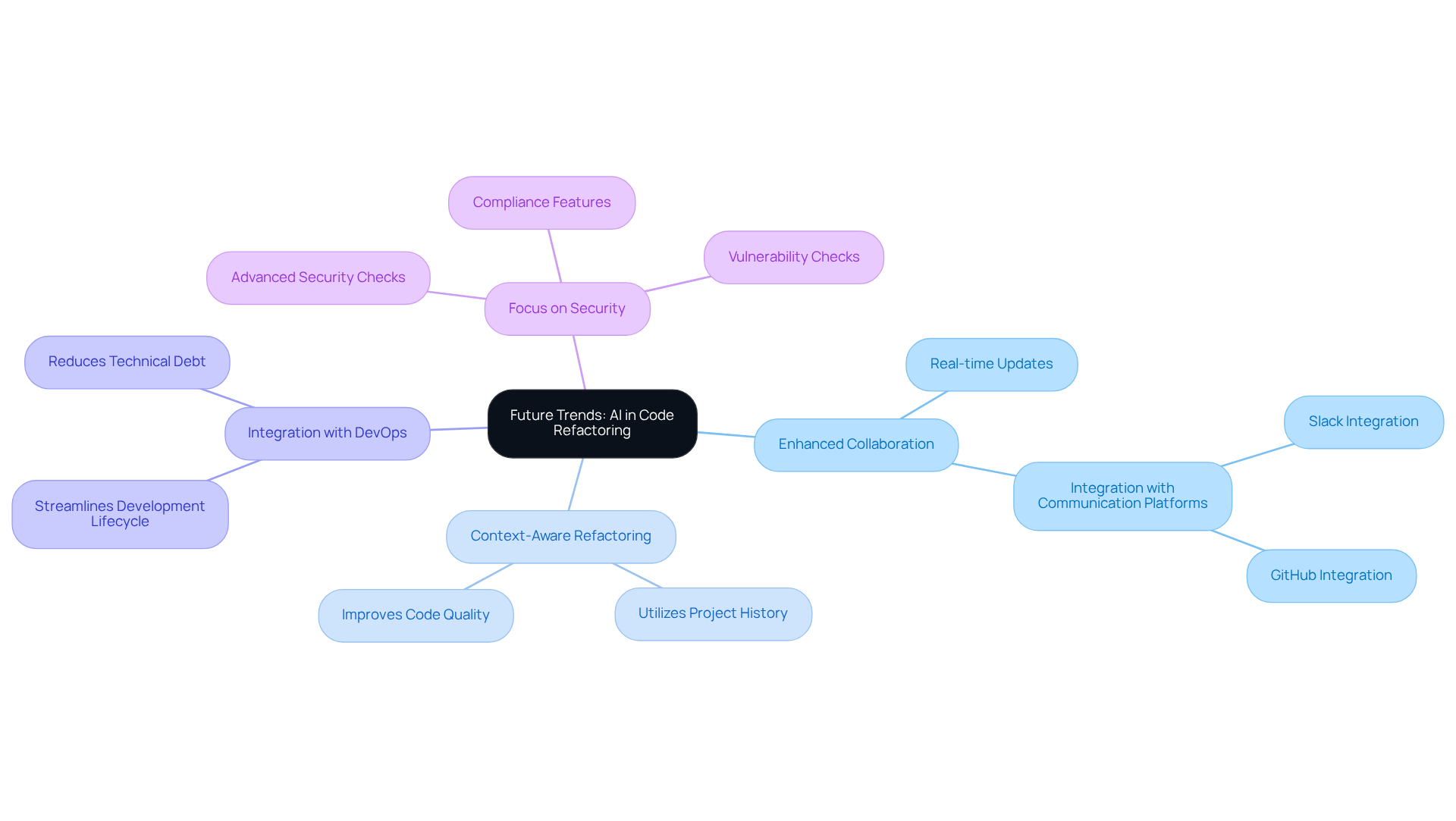Overview
Developers often encounter significant challenges in coding, from bugs to inefficient refactoring processes. How can these hurdles be overcome? Enter Kodezi, a powerful tool designed to tackle these issues head-on. With features such as automated bug detection and intelligent refactoring, Kodezi streamlines the coding process, allowing developers to focus on what truly matters—creating high-quality software.
By integrating Kodezi into their workflow, developers can experience notable improvements in productivity and code quality. Imagine reducing technical debt while enhancing collaboration within software development teams. This tool not only automates tedious tasks but also empowers developers to write cleaner, more efficient code.
Furthermore, Kodezi's user-friendly interface ensures that even mid-level developers can harness its capabilities without feeling overwhelmed. Are you ready to elevate your coding practices? Explore the array of tools available on the platform and discover how Kodezi can transform your development experience.
Introduction
In the competitive landscape of software development, coding inefficiencies can lead to significant setbacks, prompting developers to seek innovative solutions. Kodezi, an AI code refactoring tool, emerges as a powerful ally, offering features designed to enhance code quality and streamline the development process. But as the market becomes saturated with various options, how can developers discern which tool best meets their unique needs? This article delves into a comparative analysis of the top AI refactoring solutions, exploring their strengths and weaknesses to help developers make informed choices that elevate their coding practices.
Understanding AI Code Refactoring: Importance and Benefits
In the realm of software development, coding challenges are a common hurdle that developers face. These challenges often lead to inefficiencies and increased technical debt, making it essential to seek effective solutions. Enter Kodezi, an AI code refactoring tool designed to enhance existing systems without altering their external behavior. This innovative approach is crucial for improving software quality, ensuring long-term maintainability, and ultimately fostering innovation in software creation.
How does Kodezi address these challenges? With features that streamline the development process, Kodezi offers significant advantages. For instance, AI tools like Kodezi CLI can instantly identify and rectify inefficiencies, leading to cleaner and more efficient code. Organizations that enhance their Hotspot Code Health from an average of 5.15 to 9.1 can achieve a remarkable 27-43% increase in development speed and a 32-50% reduction in post-release defects, translating to substantial productivity gains.
What benefits can developers expect from using Kodezi? The advantages are compelling:
- Improved Code Quality: Kodezi CLI ensures that coding standards are uniformly applied, enhancing readability and collaboration among team members.
- Time Savings: Automating refactoring tasks allows developers to focus on new features rather than maintenance, with studies indicating that generative AI tools can enable developers to complete tasks up to twice as fast.
- Error Reduction: By automating bug identification and correction, Kodezi minimizes human error, resulting in more reliable software. A notable 77.8% of developers believe AI programming generators will positively impact script quality by reducing mistakes.
- Scalability: As codebases grow, Kodezi helps manage complexity, enabling applications to scale without compromising performance.
- Security Compliance: Kodezi ensures adherence to the latest security best practices, further enhancing software quality and reliability.
In conclusion, tools like Kodezi, an AI code refactoring tool, not only streamline the development process but also play a vital role in maintaining the health and quality of codebases. By exploring the tools available on the Kodezi platform, developers can significantly boost their productivity and elevate their coding practices.

Comparison Criteria: Evaluating AI Code Refactoring Tools
In the fast-paced world of software development, coding challenges are a common hurdle for developers. How can these challenges be effectively addressed? Kodezi offers a robust solution through its innovative AI code refactoring tool, designed to enhance productivity and code quality.
Feature Set: A comprehensive range of functionalities is crucial. Key features include Kodezi's automated bug detection, which instantly identifies and fixes codebase issues while providing detailed explanations of what went wrong and how it was resolved. This capability, along with test healing and seamless documentation updates, collectively improves quality and maintainability. As indicated in a recent survey, 64% of developers are utilizing AI resources to assist them in coding, highlighting the increasing significance of these resources in the industry.
Ease of Integration: The software's compatibility with existing development environments is vital. The integration of this platform with CI/CD pipelines and version control systems can significantly enhance workflows, facilitating easier adoption of new resources for teams without disrupting their processes. Successful integration examples illustrate how an AI code refactoring tool can enhance productivity in real-world scenarios.
User Experience: An intuitive user interface contributes to a smoother refactoring process. Tools that prioritize user experience can reduce the learning curve and enhance overall productivity. The platform's design emphasizes making debugging and optimization reachable for programmers of all levels.
Performance Metrics: The capability of the tool to enhance performance and reduce technical debt is crucial. The tool excels in resolving performance bottlenecks, identifying security issues, and improving formatting in seconds, which can be evaluated through benchmarks and analytics that showcase tangible enhancements in quality and efficiency.
Support and Community: Access to robust support resources, comprehensive documentation, and an active user community is essential for troubleshooting and sharing best practices. The platform ensures that users have the necessary resources to maximize their productivity, fostering collaboration among users and enhancing the overall experience.
In the swiftly changing environment of software creation, these criteria serve as a foundation for selecting the most effective AI code refactoring tool. By leveraging Kodezi, teams can maintain high standards of quality while adapting to new technologies.

Tool Showdown: Features, Pros, and Cons of the Top 5 AI Refactoring Solutions
In the ever-evolving landscape of software development, developers often face significant coding challenges. One AI code refactoring tool that addresses these issues is Kodezi CLI, which provides features such as bug healing, test healing, and documentation synchronization. This tool operates autonomously and integrates seamlessly with GitHub, earning praise from over 1,000,000 users for its ability to enhance debugging efficiency and productivity.
However, it’s important to consider its limitations, as Kodezi CLI is restricted to specific languages and frameworks. Other tools, such as the AI code refactoring tool RefactorAI, provide code analysis and performance metrics, boasting strong analytics and a user-friendly interface, though they may require manual adjustments. Similarly, CodeGuru excels in code reviews and security checks, particularly within AWS environments, yet may not be as versatile outside of this scope.
Sourcery is an AI code refactoring tool that offers real-time code suggestions and refactoring recommendations, making it easy to use but with limited customization options. DeepCode stands out with its AI-driven code reviews and bug detection, delivering comprehensive analysis across multiple languages, though it can be resource-intensive.
Given these unique strengths and weaknesses, developers must carefully choose tools based on their specific project requirements and team dynamics. Kodezi CLI particularly shines as a versatile solution that not only auto-heals codebases but also significantly boosts programming productivity, as evidenced by user testimonials. Are you ready to explore the range of tools available to enhance your coding practices?

Future Trends: The Evolution of AI in Code Refactoring
The future of AI code refactoring promises remarkable advancements, driven by ongoing progress in machine learning and natural language processing. Developers often face significant coding challenges; however, Kodezi is poised to address these issues effectively through its innovative features.
As AI capabilities evolve, we can expect a substantial rise in the automation of refactoring tasks through the use of an AI code refactoring tool. This shift will minimize the need for manual intervention, significantly enhancing efficiency. The CLI exemplifies this trend by autonomously improving codebases and resolving bugs before they reach production, potentially boosting productivity by as much as 30%.
- Enhanced Collaboration: Future resources are likely to foster better cooperation among team members, seamlessly integrating with popular communication platforms like Slack and GitHub. This integration will facilitate real-time updates and insights, enhancing team productivity. The CLI supports this by offering a versatile solution that enables teams to collaborate more effectively. As Satya Nadella, CEO of Microsoft, stated, "AI will be an integral part of solving the world's biggest problems, but it must be developed in a way that reflects human values."
- Context-Aware Refactoring: New AI code refactoring tools may leverage contextual awareness to suggest more relevant and significant refactoring modifications. By utilizing project history and team practices, these tools can enhance code quality. The CLI learns from previous pull requests and CI failures, continuously improving code quality through its autonomous capabilities.
- Integration with DevOps: The AI code refactoring tool will increasingly align with DevOps methodologies, streamlining the development lifecycle from coding to deployment. This alignment will enhance overall productivity, with the CLI playing a crucial role in reducing technical debt.
- Focus on Security: As security concerns grow, AI tools are expected to incorporate advanced security checks and compliance features. This ensures the integrity and safety of codebases throughout the development process. The CLI autonomously identifies vulnerabilities and enforces coding standards, maintaining a secure codebase.
Incorporating these trends not only improves code quality but also fosters a more efficient and secure development environment. Are you ready to explore Kodezi CLI further? A 5-minute quickstart guide and demo are available to help you get started.

Conclusion
In the competitive landscape of software development, developers frequently encounter significant coding challenges. The integration of AI code refactoring tools like Kodezi has emerged as a game-changer in addressing these issues. Kodezi not only streamlines the refactoring process but also enhances code quality, reduces technical debt, and empowers teams to innovate more effectively. By leveraging AI capabilities, developers can focus on creating new features while minimizing the burdens of maintenance and error correction.
Furthermore, utilizing AI code refactoring tools offers several key benefits. These include:
- Improved code quality
- Significant time savings
- Enhanced security compliance
Kodezi's features, such as automated bug detection and seamless integration with existing workflows, position it as a leading choice among developers. In addition, the comparison of various AI tools underscores the necessity of selecting the right solution based on specific project needs and team dynamics.
As the evolution of AI continues to shape the future of software development, embracing these advanced tools becomes essential. Developers are encouraged to explore the capabilities of AI code refactoring solutions to enhance their productivity and stay ahead in an ever-changing technological landscape. The future promises even greater advancements, making now the perfect time to invest in the right AI tools for code refactoring and elevate coding practices to new heights.
Frequently Asked Questions
What is Kodezi and what purpose does it serve in software development?
Kodezi is an AI code refactoring tool designed to enhance existing systems without altering their external behavior, addressing coding challenges that lead to inefficiencies and increased technical debt.
How does Kodezi improve software quality and maintainability?
Kodezi improves software quality and maintainability by streamlining the development process, ensuring coding standards are applied uniformly, and helping manage complexity as codebases grow.
What are the key features of Kodezi that benefit developers?
Key features of Kodezi include the ability to identify and rectify inefficiencies instantly, automate refactoring tasks, minimize human error, ensure security compliance, and enhance code readability and collaboration.
What specific productivity gains can organizations expect from using Kodezi?
Organizations can achieve a 27-43% increase in development speed and a 32-50% reduction in post-release defects by enhancing their Hotspot Code Health with Kodezi.
How does Kodezi help in reducing errors in software development?
Kodezi automates bug identification and correction, minimizing human error and resulting in more reliable software. A notable 77.8% of developers believe AI programming generators will positively impact script quality by reducing mistakes.
In what ways does Kodezi contribute to scalability in software applications?
Kodezi helps manage complexity as codebases grow, enabling applications to scale without compromising performance.
How does Kodezi ensure security compliance in software development?
Kodezi ensures adherence to the latest security best practices, thereby enhancing software quality and reliability.




